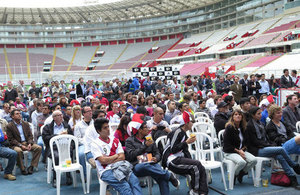Peruvian and English fans gather to share football and friendship
Hundreds of fans from Peru and England watched the friendly match between their countries live at the National Stadium of Lima. The event was organised by the British Embassy, the British-Peruvian Chamber of Commerce and the Peruvian Sports Institute (IPD).

Football match at Estadio Nacional
A live screening of the friendly football match between Peru and England on 30 May, 2014 was held at the National Stadium in Lima – built on land donated to the Peruvian state by the British community in 1921. This was the first time the two teams had played in over 50 years and was the first time they had met in London. England won the last game in 1962 4-0 after losing 4-1 in 1959.
Hundreds of special guests from diplomatic bodies, local business and sports institutions took part in the event organised by the British Embassy, the British-Peruvian Chamber of Commerce and the Peruvian Sports Institute (IPD) as a way to promote sports and strengthen friendships. Attendees also enjoyed sponsor display stands, food and drinks, mini-football, and facepainting. Raffle tickets were sold to collect funds for the UK-based children’s charity Project Peru, which provides shelter and education to forty children in the Zapallal area of Northern Lima. The prizes included one return flight to London, two peruvian football shirts (one of them signed by the national squad), two Official World cup Match Balls and one Chelsea Football Shirt.
Although Peru lost 3-0 everyone had a great time and enjoyed the party atmosphere. British Ambassador James Dauris expressed his happiness over the friendly atmosphere at the Stadium and highlighted the importance of the match to strengthen sport bonds between Peru and the UK. We would like to thank the event’s sponsors, Avianca, Samsung, Telefonica, Backus, Belmond, G4S, Lindley, Russell Bedford and The Futbolstore without whom the event could not have happened.